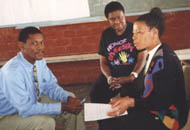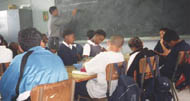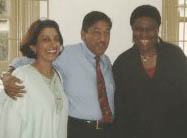
Dr.
Lott Mamobolo (right) and Ms. Fae Samuels (above centre, with
teachers role playing)

The Deputy
Principal,
Mr. Simpson (at blackboard) during a classroom lesson

Ms. Reshma
Sathiparsad,
Mr
Akkers and Ms Fae Samuels
St.
Theresa's caters to learners from Grade 1 to 7. It has 500 learners,
14 teachers, a principal and a deputy prinicipal. It was our job
to introduce the Future Aces program to teachers and learners at the
school.
The
Future Aces Philosophy supports the common curriculum by helping develop
a positive sense of self respect and concern for others, as well
as a sense of belonging in the community, a sense of social responsibility,
a commitment to democracy and human rights, and a love of learning. It
also involved staff development workshops on conflict resolution. We
also conducted a conflict resolution presentation to the social work, phychology
and B.Ed. students at the University of Natal.
Future Aces is a Canadian program designed to help students
develop self-confidence that will enable them to utilise their abilities in a
positive way. It provides a model for behaviour based on teacheable social skills.
The creed was adopted by the Board of Education in the former North York (now
part of the Toronto District School Board) in 1990.
At St. Theresa's Catholic Primary School the Future Aces Program
was introduced to Ms. Munin's Grade 6 and 7 lifeskills classes. These are large
classes and the program appeared appropriate in helping with interpersonal skill
development. Learners were challenged to embrace the Future Aces philosophy which
is based on motivating them to utilise their abilities in a positive way.
Learners showed enthusiam for the values expressed in the Future Aces creed. Ms. Munin spent approximately 10 to 15 minutes every day in each class stressing the importance of cooperative learning, one of the values promoted by the Future Aces program.
The program and its application to the school curriculum was presented to the whole school. Teachers who attended the workshop were able to recognise the importance of including the Future Aces philosophy in their curriculum. The Deputy Principal, Mr. Simpson, was also enthusiastic about the Future Aces program. He included some of the cooperative learning strategies in his Grade 7 Mathematics and Economics groups activity lessons.
A staff development workshop on cooperative interpersonal relationships was conducted for teachers at St. Theresa's Catholic Primary School. Another workshop on Violence Prevention and conflict resolution was presented to the social work, psychology and B.Ed. students at the University of Natal.
Although teachers were motivated and positive about the conflict resolution program, they were concerned about some of the difficulties and challenges they had to deal with in order to effectively implement the program.
Their
concerns included the following:
• Lack of psychological and social work support (teachers were appreciative
of the University of Natal's conflict resolution social work program);
• Dealing with learners who have been exposed to traumatic experiences;
• Dealing with learners who present behavioural problems;
• Dealing with disruptive and aggressive behaviours;
• Lack of resources to address violence and conflict in the classrooms.
It would appear the conflict resolution program offered by
Ms. Reshma Sathiparsad, who runs violence prevention and conflict resolution
programs in several elementary schools, providing opportunities for practicums
for her Social Work II students.
It is the only program available to
a limited
number of schools in Kwa-Zulu Natal. This program should be made available
to more schools
in order to effectively address the problem of violence in schools.
The project was well received and the SAWW board has approved
a program to invite Ms Sathiparsad to visit Canada next year and view the
conflict resolution models here.